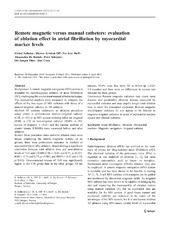Remote magnetic versus manual catheters: evaluation of ablation effect in atrial fibrillation by myocardial marker levels
Solheim, Eivind; Off, Morten Kristian; Hoff, Per Ivar; De Bortoli, Alessandro; Schuster, Peter; Ohm, Ole-Jørgen; Chen, Jian
Peer reviewed, Journal article
Published version
Permanent lenke
https://hdl.handle.net/1956/5222Utgivelsesdato
2011-04-08Metadata
Vis full innførselSamlinger
Originalversjon
https://doi.org/10.1007/s10840-011-9567-zSammendrag
Background A remote magnetic navigation (MN) system is available for radiofrequency ablation of atrial fibrillation (AF), challenging the conventional manual ablation technique. The myocardial markers were measured to compare the effects of the two types of MN catheters with those of a manual-irrigated catheter in AF ablation. Methods AF patients underwent an ablation procedure using either a conventional manual-irrigated catheter (CIR, n=65) or an MN system utilizing either an irrigated (RMI, n=23) or non-irrigated catheter (RMN, n=26). Levels of troponin T (TnT) and the cardiac isoform of creatin kinase (CKMB) were measured before and after ablation. Results Mean procedure times and total ablation times were longer employing the remote magnetic system. In all groups, there were pronounced increases in markers of myocardial injury after ablation, demonstrating a significant correlation between total ablation time and post-ablation levels of TnT and CKMB (CIR r=0.61 and 0.53, p<0.001; RMI r=0.74 and 0.73, p<0.001; and RMN r=0.51 and 0.59, p<0.01). Time-corrected release of TnT was significantly higher in the CIR group than in the other groups. Of the patients, 59.6% were free from AF at follow-up (12.2± 5.4 months) and there were no differences in success rate between the three groups. Conclusions Remote magnetic catheters may create more discrete and predictable ablation lesions measured by myocardial enzymes and may require longer total ablation time to reach the procedural endpoints. Remote magnetic non-irrigated catheters do not appear to be inferior to magnetic irrigated catheters in terms of myocardial enzyme release and clinical outcome.

